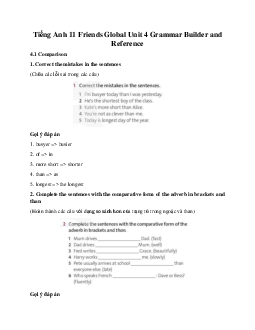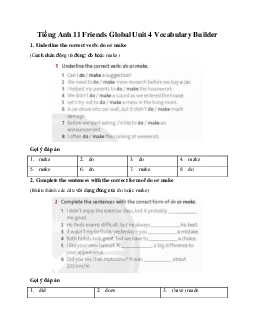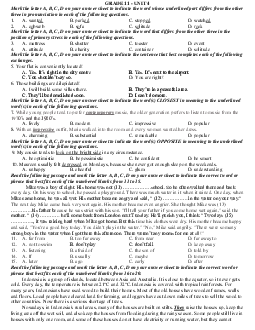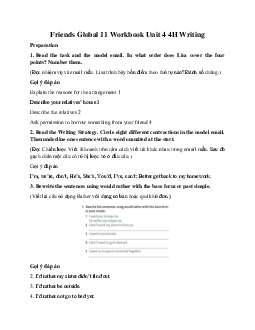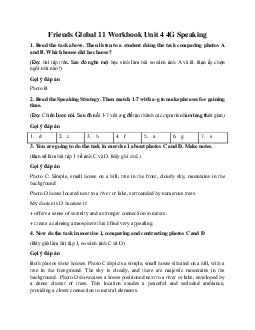




Preview text:
Tiếng Anh 11 Friends Global Unit 4 4C Listening
1. SPEAKING Work in pairs. Look at the photo, title and slogan opposite. What
happens on a 'Big Sleep Out', do you think? Read the article and check your answer.
(Làm việc theo cặp. Nhìn vào bức ảnh, tiêu đề và khẩu hiệu đối diện. Bạn có nghĩ điều gì
sẽ xảy ra trong 'Big Sleep Out' không? Đọc bài viết và kiểm tra câu trả lời của bạn.) Gợi ý đáp án
The Big Sleep Out is a charity event which raises money for young homeless people.
People sleep rough for one night to understand what life for homeless people in the UK.
2. Read Listening Strategy 1. Complete the definitions with the words below.
(Đọc Chiến lược Nghe 1. Hoàn thành các định nghĩa với các từ dưới đây.) Gợi ý đáp án 1. ignore 2. try 3. enjoy 4. talk 5. contact
3. Listen to two short recordings. Answer the questions. Use the verbs and phrases in exercise 2 to help you.
(Nghe hai đoạn ghi âm ngắn. Trả lời các câu hỏi. Sử dụng các động từ và cụm từ trong
bài tập 2 để giúp bạn.) Gợi ý đáp án 1. No, she didn’t enjoy it. 2. No, she didn’t. 3. Yes, he does. 4. No, they didn’t Nội dung bài nghe
Speaker 1 I decided to try the Big Sleep Out for the first time this year. My neighbour did
it and had the time of her life. But I didn’t! Not because it was too cold but because some
people next to me were making so much noise. I nearly had a word with the organisers, but decided not to in the end.
Speaker 2 I think the organisers did a good job. They made a big effort to publicise the
event this year. Last year was a disaster. Nobody got in touch with the local newspaper or
radio station, so there were no journalists there at all. It was a waste of time, really.
4. Read Listening Strategy 2. Then listen to three recordings. Which excerpts
contain formal language? Use the table below to help you identify them.
(Đọc Chiến lược nghe 2. Sau đó nghe ba đoạn ghi âm. Đoạn trích nào có ngôn ngữ trang
trọng? Sử dụng bảng dưới đây để giúp bạn xác định chúng.) Gợi ý đáp án
Excerpts 1 and 3 use formal language
5. Listen again. Choose the correct answers (a–c).
(Nghe lại. Chọn câu trả lời đúng (a–c).) Gợi ý đáp án 1. a 2. c 3. c
6. SPEAKING Discuss these questions with your partner.
(Thảo luận những câu hỏi này với bạn của bạn.) Gợi ý đáp án
A: What do you think would be the worst thing about being homeless?
B: I think it would be the weather. Imagine having to sleep outside in the rain or snow, it
would be so uncomfortable and dangerous for your health.
A: That's definitely a big challenge. What do you think governments should do to tackle the problem of homelessness?
B: I believe they should increase funding for affordable housing programs and rent
subsidies to help low-income individuals and families access stable housing. They could
also provide more funding for emergency shelters and outreach programs to help people get off the streets.
A: That makes sense. And what can individuals do to help the homeless?
B: There are many ways to help, such as volunteering at shelters, donating money or
supplies, or even just showing kindness and empathy towards homeless people you encounter in your daily life.
